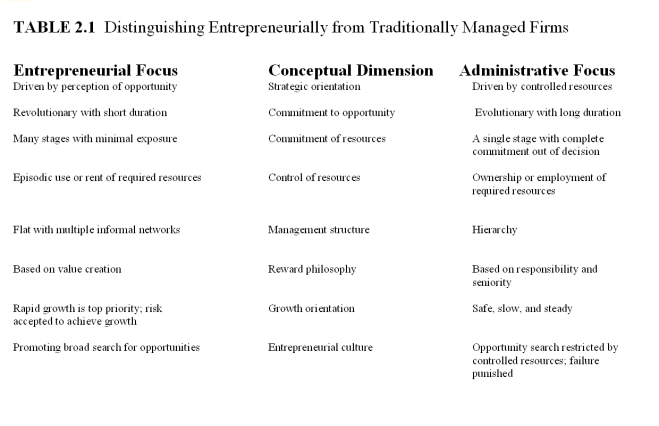Discuss three major ways in which managerial and entrepreneurial decision making differs.
Eight areas of difference students can choose from:
1.strategic orientation
2.commitment to opportunity
3.commitment of resources
4.control of resources
5.management structure
6.reward philosophy
7.growth orientation
8.entrepreneurial culture
Basic differences in each dimension:
 Source:This table is taken from T.Brown,P.Davidsson,and J.Wiklund,"An Operationalization of Stevenson's Conceptualization of Entrepreneurship as Opportunity-Based Firm Behavior," Strategic Management Journal 22 (2001).
Source:This table is taken from T.Brown,P.Davidsson,and J.Wiklund,"An Operationalization of Stevenson's Conceptualization of Entrepreneurship as Opportunity-Based Firm Behavior," Strategic Management Journal 22 (2001).
Definitions:
Milgram Experiment
A psychological experiment conducted by Stanley Milgram in the 1960s to study obedience to authority, where participants were instructed to administer electric shocks to another person.
Stanford University Prison Experiment
A psychological study conducted by Philip Zimbardo in 1971 at Stanford University, where students were assigned roles of prisoners and guards to explore the effects of perceived power.
Generalization
Drawing a conclusion about a certain characteristic of a population based on a sample from it.
Logical Support
The provision of reasons or evidence to justify a claim or argument.
Q3: Compare and contrast the two conceptualizations of
Q5: Values play a very small role in
Q10: There is a universal set of leader
Q18: A trend toward less stereotypically masculine characterizations
Q39: What are the important gender issues with
Q41: An entrepreneur's recovery from grief is detrimental
Q51: Transformational leadership uses _ as the fuel
Q53: Leaders with strong _ values enjoy competition,being
Q61: Before writing the business plan an entrepreneur
Q65: Investors often spend a lot of time